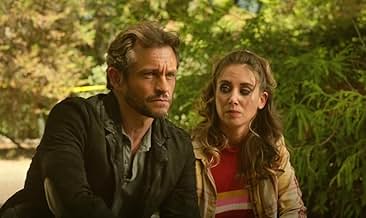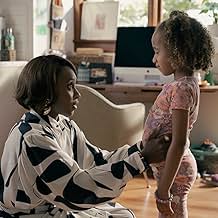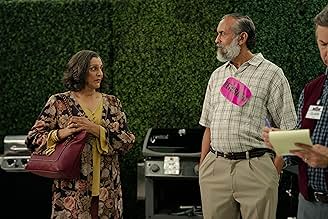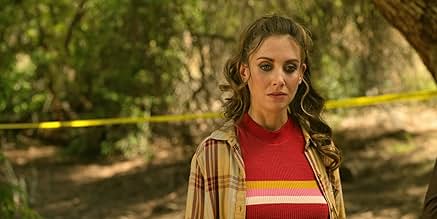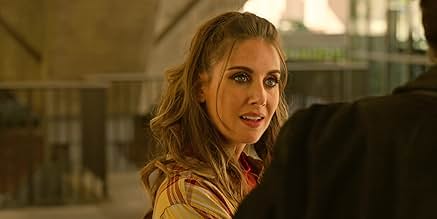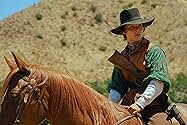Avec un casting de premier plan, cette série d'anthologie mélange les genres et propose huit fables féministes à l'humour noir qui abordent de manière inattendue des sujets tels que les rôle... Tout lireAvec un casting de premier plan, cette série d'anthologie mélange les genres et propose huit fables féministes à l'humour noir qui abordent de manière inattendue des sujets tels que les rôles genrés, l'autonomie et l'identité.Avec un casting de premier plan, cette série d'anthologie mélange les genres et propose huit fables féministes à l'humour noir qui abordent de manière inattendue des sujets tels que les rôles genrés, l'autonomie et l'identité.
- Récompenses
- 1 nomination au total
Parcourir les épisodes
Avis à la une
I'm a huge fan of female-centric stories. All of the messages contained within this anthology series is an opportunity to take something away from each. The performers brought the high quality that we've come to expect. The cinematography was first-rate.
I did struggle with the overtly allegorical narrative style, as each subject matter tends to be delivered somewhat on the nose, which is kind of the point I guess. However this style of using the metaphor to blur the lines between realism and symbolic carries with it a distinct air of an ambitious student art film project.
All forms of self-expression are valid and this is no exception. It just takes some open-mindedness and adjustment as an audience member to participate in this experience.
I did struggle with the overtly allegorical narrative style, as each subject matter tends to be delivered somewhat on the nose, which is kind of the point I guess. However this style of using the metaphor to blur the lines between realism and symbolic carries with it a distinct air of an ambitious student art film project.
All forms of self-expression are valid and this is no exception. It just takes some open-mindedness and adjustment as an audience member to participate in this experience.
You have to tune in just to see Nicole Kidman and Judy Davis going head-to-head, but there's a lot more to enjoy in this poignant yet whimsical anthology series from GLOW creators Liz Flahive and Carly Mensch.
The series is based on a collection of short stories by Irish writer Cecelia Ahern, and each of the eight half-hour episodes brings its own splash of magical realism or Black Mirror-style sci-fi as it illuminates a different facet of female experience. Common themes wend throughout, but the tone of each individual episode is different.
There's a layered melancholy to Kidman's and Davis's episode, The Woman Who Ate Photographs, which is made all the more resonant by the nostalgic ordinariness of its Australian setting. Kidman plays a woman nearing the end of her tether as she sets off in a moving van to bring her Alzheimer's-afflicted mother (Davis) to live with her and her husband and son (Simon Baker and Kai Lewins), who aren't giving her quite the support that she needs.
It's fun to see Kidman slapping the steering wheel while singing along to Midnight Oil and Dexys Midnight Runners, but Australian director Kim Gehrig, who has made music videos for Chaka Khan and Brittany Howard, among others, extracts a real ache from the NSW scenery, not least the rural brick veneer in which Davis' character has been rattling around on her own.
Davis, who was so devastatingly brilliant recently in Nitram (Stan), produces another emotionally piercing performance as a woman who is by turns hostile, vulnerable, disapprovingly distant, mischievous and scared. The gulf between mother and daughter yawns like the Burragorang Valley in what is a memorable little piece of work.
GLOW fans, meanwhile, will particularly enjoy other episodes involving Alison Brie as a ghost investigating her own murder, and Betty Gilpin as a woman whose husband keeps her, quite literally, on a shelf - at least until she busts out into an old-timey dance number, whirling through a thoroughly modern and thoroughly bemused Los Angeles.
Issa Rae (Insecure) delivers a particularly strong performance in what is paradoxically one of the series' weaker episodes, about a successful black writer feeling increasingly invisible to the white showbiz world that's courting her; and Merritt Wever is typically amazing as a woman whose dead-end dating life takes a strange turn when she meets a charming male-feminist duck.
Streaming services are glutted with anthology series, but we still needed this one. Truthful, validating and sometimes just plain magical.
The series is based on a collection of short stories by Irish writer Cecelia Ahern, and each of the eight half-hour episodes brings its own splash of magical realism or Black Mirror-style sci-fi as it illuminates a different facet of female experience. Common themes wend throughout, but the tone of each individual episode is different.
There's a layered melancholy to Kidman's and Davis's episode, The Woman Who Ate Photographs, which is made all the more resonant by the nostalgic ordinariness of its Australian setting. Kidman plays a woman nearing the end of her tether as she sets off in a moving van to bring her Alzheimer's-afflicted mother (Davis) to live with her and her husband and son (Simon Baker and Kai Lewins), who aren't giving her quite the support that she needs.
It's fun to see Kidman slapping the steering wheel while singing along to Midnight Oil and Dexys Midnight Runners, but Australian director Kim Gehrig, who has made music videos for Chaka Khan and Brittany Howard, among others, extracts a real ache from the NSW scenery, not least the rural brick veneer in which Davis' character has been rattling around on her own.
Davis, who was so devastatingly brilliant recently in Nitram (Stan), produces another emotionally piercing performance as a woman who is by turns hostile, vulnerable, disapprovingly distant, mischievous and scared. The gulf between mother and daughter yawns like the Burragorang Valley in what is a memorable little piece of work.
GLOW fans, meanwhile, will particularly enjoy other episodes involving Alison Brie as a ghost investigating her own murder, and Betty Gilpin as a woman whose husband keeps her, quite literally, on a shelf - at least until she busts out into an old-timey dance number, whirling through a thoroughly modern and thoroughly bemused Los Angeles.
Issa Rae (Insecure) delivers a particularly strong performance in what is paradoxically one of the series' weaker episodes, about a successful black writer feeling increasingly invisible to the white showbiz world that's courting her; and Merritt Wever is typically amazing as a woman whose dead-end dating life takes a strange turn when she meets a charming male-feminist duck.
Streaming services are glutted with anthology series, but we still needed this one. Truthful, validating and sometimes just plain magical.
I didn't realize this was based on the book of stories by Cecelia Ahern, which I own but haven't read yet. On the surface, these stories are abstract, absurd, and likely not for everyone. But if you understand the metaphors (abusive relationships, trophy wives, etc.), this is a well-done, well-written anthology.
Some fine and thoughtful storytelling portraying ambitious and challenging concepts, unsurprisingly some hit home and others not. Inevitably there will be disagreement on which is which, for me the best three are the returned husband, the shelf and the horses. The weakest is the murder story, followed by the disappearance and the duck.
High quality casting throughout with some tightly written scripts packing a lot into 30 minute episodes. A variable, yet ultimately enjoyable anthology.
High quality casting throughout with some tightly written scripts packing a lot into 30 minute episodes. A variable, yet ultimately enjoyable anthology.
Each episode ends abruptly; and on parts that simply need to be explained more. It's left me feeling agitated and dissatisfied. It's like they are trying to be mysterious by being obscure and I think most people are tired of the genre of "It's open to interpretation." Messages are vague, and there should be sufficient endings, because I just feel like I'm being teased.
On the positive side, the cinematography is great, and the women in this show are excellent!
On the positive side, the cinematography is great, and the women in this show are excellent!
Le saviez-vous
- AnecdotesThe title is a reference to the feminist anthem, "I Am Woman, Hear Me Roar" by Helen Reddy.
Meilleurs choix
Connectez-vous pour évaluer et suivre la liste de favoris afin de recevoir des recommandations personnalisées
Détails
Contribuer à cette page
Suggérer une modification ou ajouter du contenu manquant

![Regarder Trailer Season 1 [OV]](https://m.media-amazon.com/images/M/MV5BMjdhZDI4NWEtMGY1OC00ZWI2LThkMWQtMjAwNjUwOTkyMWRmXkEyXkFqcGdeQXRyYW5zY29kZS13b3JrZmxvdw@@._V1_QL75_UX500_CR0)
